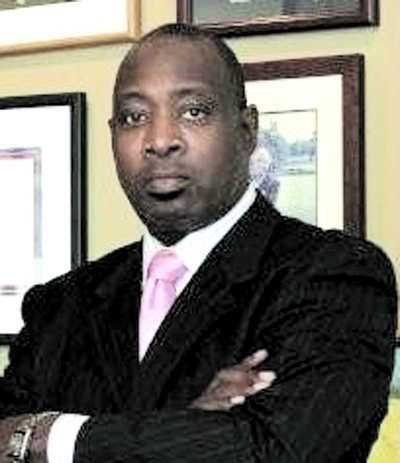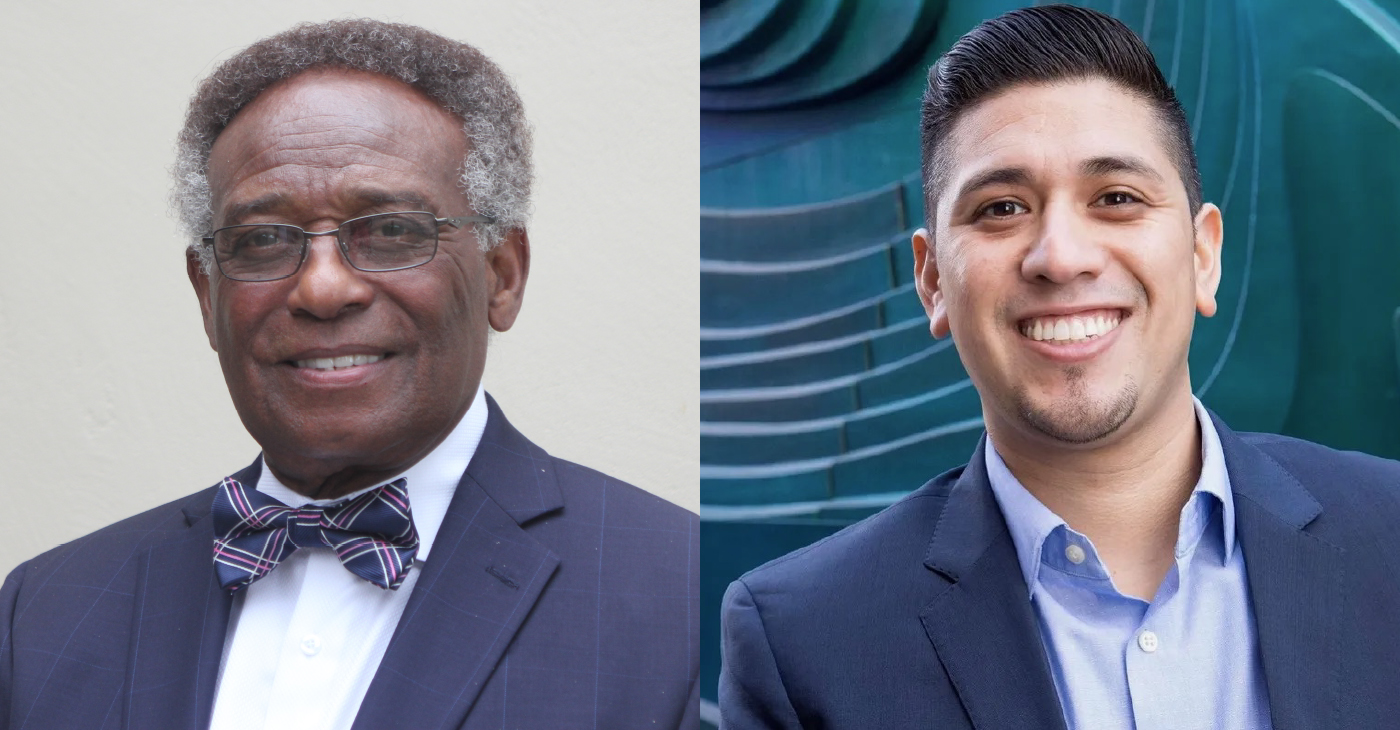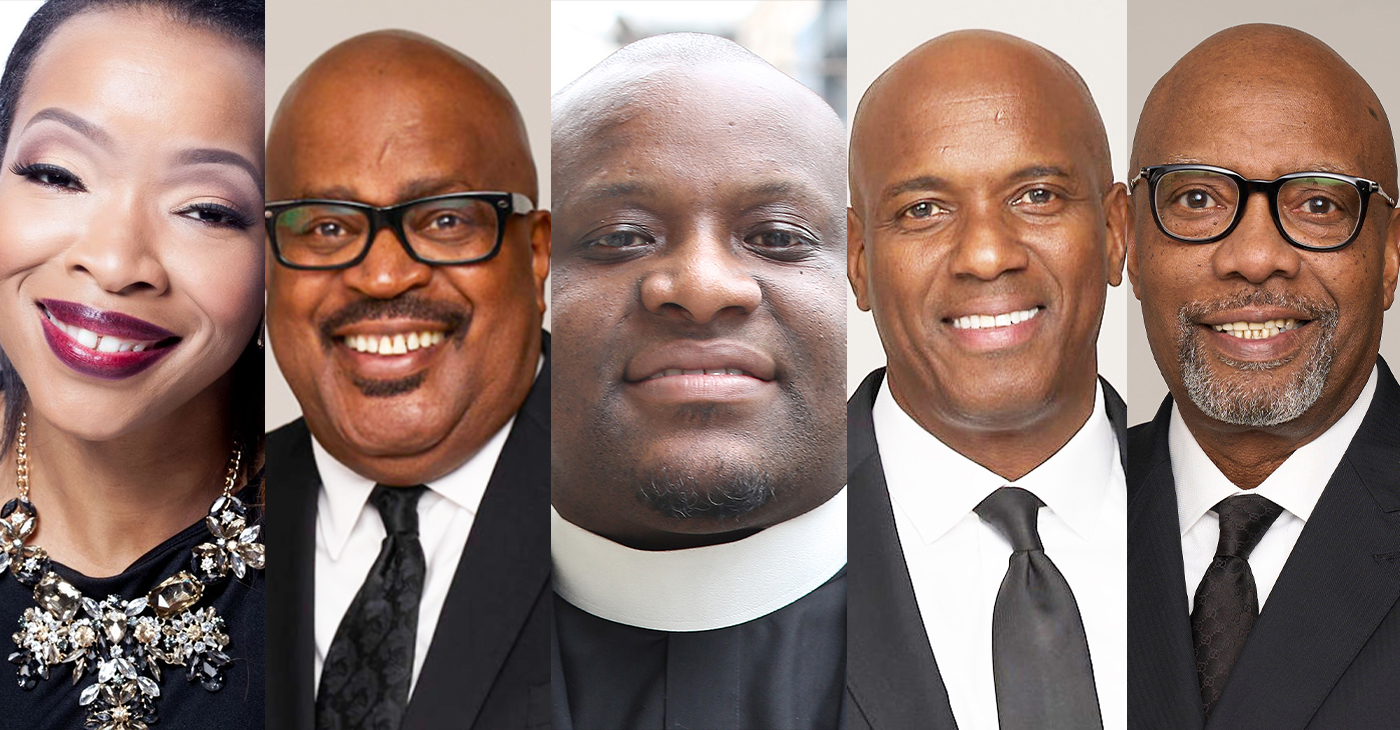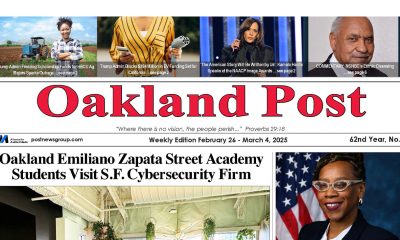Opinion
The Inevitability of Reparations; Denied But Not Defeated

God on Wall Street
For those who might be curious about why I’m writing on reparations, be assured about one thing; this is not entertainment! I am not a lawyer, however, since I can read and write, I choose to write to inform.
On March 11, 1867, House Speaker Thaddeus Stevens introduced HR-29, which said, “Out of the lands thus seized and confiscated, the slaves who have been liberated by the operations of the war and the amendment of the Constitution or otherwise, who resided in said ‘Confederate States’ on the 4th day of March, A.D. 1861 or since, shall have distributed to them as follows namely: to each male person who is the head of a family, 40 acres; to each adult male, whether the head of the family or not, 40 acres; to each widow who is the head of a family, 40 acres; to be held by them in fee simple, but to be inalienable for the next 10 years after they become seized thereof.”
In 2019, 152 years later, Sheila Jackson Lee has reignited this discussion.
The Ex-Slave Mutual Relief, Bounty and Pension Association was one of many such associations that began to draw attention at the beginning of the 20th century. It was an organization of former slaves who made a valid proposition to receive pension checks from the U.S. government.
The most favorable outcome would be for ex-slaves 70 and older. Then from there, a tiered system was to be put into place that would seek benefits from the U.S. government for any labor that was free, and any land that was given.
Certificates were sold to former slaves and their beneficiaries as proof that they were seeking some form of reparations.
I cannot imagine that anyone who was an ex-slave at this moment in history, would voluntarily opt-out of this program.
And the longer that America delays this process, the guilt grows daily. Until America faces up to its hand at slavery, white supremacists will never devolve, America’s consciousness will continue to have diminishing effects on its populous, and we will all have to keep telling lies that cover up the other lies.
Those of us who can say something, but refuse to speak out about it, are similarly as conflicted as those whose trickery, wrapped in the shape of a cross, refuse to believe that African Americans are owed anything.
I have written enough about this subject now to have a deeper discussion.
Activism
Oakland Post: Week of March 28 – April 1, 2025
The printed Weekly Edition of the Oakland Post: Week of March 28 – April 1, 2025

To enlarge your view of this issue, use the slider, magnifying glass icon or full page icon in the lower right corner of the browser window.
Activism
We Fought on Opposite Sides of the Sheng Thao Recall. Here’s Why We’re Uniting Behind Barbara Lee for Oakland Mayor
Today, we are coming together to do all we can to make sure Barbara Lee is elected Mayor in the April 15 Oakland special election. Here’s why. Now more than ever, Oakland needs a respected, hands-on leader who will unite residents behind a clear vision for change. The next mayor will have to hit the ground running with leaders and stakeholders across our political divide to get to work solving the problems standing in the way of Oakland’s progress. Job No. 1: improving public safety. Everyone agrees that all Oaklanders deserve to feel safe in their neighborhoods. But sadly, too many of us do not.

By Robert Harris and Richard Fuentes
Special to The Post
The City of Oakland is facing a number of urgent challenges, from housing and public safety to a pressing need for jobs and economic development. One of us, Robert Harris, supported the November recall vote that removed Mayor Sheng Thao from office. Meanwhile, Richard Fuentes believed the recall was the wrong strategy to tackle Oakland’s challenges.
Today, we are coming together to do all we can to make sure Barbara Lee is elected Mayor in the April 15 Oakland special election. Here’s why.
Now more than ever, Oakland needs a respected, hands-on leader who will unite residents behind a clear vision for change.
The next mayor will have to hit the ground running with leaders and stakeholders across our political divide to get to work solving the problems standing in the way of Oakland’s progress.
Job No. 1: improving public safety. Everyone agrees that all Oaklanders deserve to feel safe in their neighborhoods. But sadly, too many of us do not.
During her three decades in the state Legislature and Congress, Lee made public safety a priority, securing funding for police and firefighters in Oakland, delivering $15.8 million in community safety funding, and more. Today, she has a plan for making Oakland safer. It starts with making sure police are resourced, ready, and on patrol to stop the most dangerous criminals on our streets.
Oakland residents and business owners are feeling the impact of too many assaults, smash/grabs, retail thefts, and home robberies. Lee will increase the number of police on the streets, make sure they are focused on the biggest threats, and invest in violence prevention and proven alternatives that prevent crime and violence in the first place.
In addition, on day one, Barbara Lee will focus on Oakland’s business community, creating an advisory cabinet of business owners and pushing to ensure Oakland can attract and keep businesses of all sizes.
The other top issue facing Oakland is housing and homelessness. As of May 2024, over 5,500 people were unhoused in the city. Oaklanders are just 25% of the population of Alameda County, but the city has 57% of the unhoused population.
Unhoused people include seniors, veterans, single women, women with children, people who suffer physical and mental illness, unemployed and undereducated people, and individuals addicted to drugs. Some are students under 18 living on the streets without their parents or a guardian. Research shows that 53% of Oakland’s homeless population is Black.
Starting on her first day in office, Lee will use her national profile and experience to bring new resources to the city to reduce homelessness and expand affordable housing. And she will forge new public/private partnerships and collaboration between the City, Alameda County, other public agencies, and local nonprofits to ensure that Oakland gets its fair share of resources for everything from supportive services to affordable housing.
Besides a public safety and housing crisis, Oakland has a reputational crisis at hand. Too many people locally and nationally believe Oakland does not have the ability to tackle its problems.
Lee has the national reputation and the relationships she can use to assert a new narrative about our beloved Oakland – a vibrant, diverse, and culturally rich city with a deep history of activism and innovation.
Everyone remembers how Lee stood up for Oakland values as the only member of Congress not to authorize the disastrous Iraq War in 2001. She has led the fight in Congress for ethics reform and changes to the nation’s pay-to-play campaign finance laws.
Lee stands alone among the candidates for mayor as a longtime champion of honest, transparent, and accountable government—and she has the reputation and the skills to lead an Oakland transformation that puts people first.
The past few years have been a trying period for our hometown.
Robert Harris supported the recall because of Thao’s decision to fire LeRonne Armstrong; her refusal to meet with certain organizations, such as the Oakland Branch of the NAACP; and the city missing the deadline for filing for a state grant to deal with serious retail thefts in Oakland.
Richard Fuentes opposed the recall, believing that Oakland was making progress in reducing crime. The voters have had their say; now, it is time for us to move forward together and turn the page to a new era.
The two of us don’t agree on everything, but we agree on this: the next few years will be safer, stronger, and more prosperous if Oaklanders elect Barbara Lee as our next mayor on April 15.
Robert Harris is a retired attorney at PG&E and former legal counsel for NAACP.
Richard Fuentes is co-owner of FLUID510 and chair of the Political Action Committee, American Federation of State, County, and Municipal Employees (AFSCME) Council 57.
Activism
Faith Leaders Back Barbara Lee for Mayor, Criticize Candidate Loren Taylor for Dishonest Campaigning
Speaking as individuals, participants in the interview were Pastor Michael Wallace of the Mount Zion Missionary Baptist Church; Pastor Mike McBride, Oakland resident and pastor of the Way Christian Center in Berkeley; Rev. Dr. Jacqueline Thompson of Allen Temple Baptist Church; Bishop Kevin Barnes, pastor of the Abyssinian Baptist Church; and Bishop Keith Clark of Word Assembly.

‘Barbara Lee has a proven track record of listening to the community and translating things into action, and not just talking about it, but doing it. And I believe that this is one of the qualities that will serve her well as being our mayor,’ said Pastor Kevin Barnes
The Black Church PAC, a national faith leaders initiative, will be posting its endorsement of Lee this week
Ken Epstein
Prominent local faith leaders held a telephone interview Thursday with the Oakland Post to express their concerns about the election and their support for former Congresswoman Barbara Lee for Mayor of Oakland.
Speaking as individuals, participants in the interview were Pastor Michael Wallace of the Mount Zion Missionary Baptist Church; Pastor Mike McBride, Oakland resident and pastor of the Way Christian Center in Berkeley; Rev. Dr. Jacqueline Thompson of Allen Temple Baptist Church; Bishop Kevin Barnes, pastor of the Abyssinian Baptist Church; and Bishop Keith Clark of Word Assembly.
“I feel that this is a critical election for the City of Oakland,” said Pastor Wallace. “Our city is in a crisis, and we need someone who has the experience to stabilize our city and to go beyond the borders of our city to bring resources to address the issues that we’re facing.”
The leaders also criticized another candidate, former Oakland City Councilmember Loren Taylor, for conducting a dishonest smear campaign against Lee and urged Oakland flatland residents to go to the polls and join efforts to actively encourage others to vote in the April 15 special election.
Pastor McBride said, “I believe Oakland needs to send a loud message that our city is not for sale. Barbara Lee is the epitome of ‘unbought, unbossed’ integrity and is someone who has brought results. It has been very offensive to listen to candidates in this race, particularly Loren Taylor, attempt to disparage her name and discredit her record.”
“I truly believe that Congresswoman Lee is the best-suited candidate” for the job, he continued, adding that it is “absolutely crucial that individuals in our communities, particularly in the flatlands, are encouraged to participate in this process because the stakes are high, and I don’t think we should surrender our city to special interests. We have to let (people) know that our city will not be seized without our voices being heard.”
Pastor McBride added, “The only way we can really ensure that we’re going to be able to do that is to make sure that Oakland does not fall into such dishonor is to vote with a level of turnout that ensures the election is not close.”
“Barbara Lee has spoken for us, not just through slogans and not just through rhetoric, but she’s bought billions of dollars just in the last two years, arguably in the worst era of pandemic suffering. She has helped to stabilize the city,” he said.
Pastor McBride said that this race has attracted a lot of outside “money and supporters who align themselves with the likes of [President Donald] Trump. Any candidate running for mayor of Oakland who can be attractive to MAGA ought to give folks a pause. Why is Barbara Lee not the candidate for MAGA but Loren Taylor seems to be?”
Rev. Thompson said, “I’m concerned about the tone and the tenor of the race. We have proof from Washington, D.C., that elections matter. It is not just a matter of that you are running, but it is also how you are running. So, the idea that there would be an attempt to castigate the character of a woman who’s been wholly committed, not just to her district but to her city, is concerning.
“The idea that misinformation and alternative facts would be allowed to be propagated, unchecked, without any attempt to correct it by someone who seeks to be our leader is challenging to me,” said Thompson. “I support Barbara Lee because Barbara Lee is a proven leader.
“She’s proven that she can bring people together,” she said. “She has also proven when she stood as the lone person against the vote for a blank check in times of war that she cannot be bought, that she will keep the needs of the people, not just the needs of those who are considered elite or up-and-coming, but the needs of the least and the lost and the ‘left out’ of this city.”
Dr. Thompson said, “I support her because has been faithful to this city, whether you have seen her or whether you have not seen her. The millions and billions of dollars that she has brought to our area is unquestionable.”
The Black Church PAC, a national initiative led by faith leaders including Dr. Frederick D. Haynes, will post its endorsement of Congresswoman Barbara Lee this week.
Bishop Clark said, “In times like these we need someone who can fix and build our city and communities, and I believe that Congresswoman Barbara Lee can do the job”
“Barbara Lee has a proven track record of listening to the community and translating things into action, and not just talking about it, but doing it. And I believe that this is one of the qualities that will serve her well as being our mayor,” said Bishop Barnes.
-

 #NNPA BlackPress4 weeks ago
#NNPA BlackPress4 weeks agoTarget Takes a Hit: $12.4 Billion Wiped Out as Boycotts Grow
-

 Activism4 weeks ago
Activism4 weeks agoUndocumented Workers Are Struggling to Feed Themselves. Slashed Budgets and New Immigration Policies Bring Fresh Challenges
-

 Activism4 weeks ago
Activism4 weeks agoOakland Post: Week of February 26 – March 4, 2025
-

 #NNPA BlackPress4 weeks ago
#NNPA BlackPress4 weeks agoBREAKING Groundbreaking Singer Angie Stone Dies in Car Accident at 63
-

 #NNPA BlackPress4 weeks ago
#NNPA BlackPress4 weeks agoNAACP Legend and Freedom Fighter Hazel Dukes Passes
-

 Arts and Culture4 weeks ago
Arts and Culture4 weeks agoBeverly Lorraine Greene: A Pioneering Architect and Symbol of Possibility and Progress
-

 #NNPA BlackPress4 weeks ago
#NNPA BlackPress4 weeks agoTrump Kicks the Ukrainian President Out of the White House
-

 #NNPA BlackPress4 weeks ago
#NNPA BlackPress4 weeks agoApple Shareholders Reject Effort to Dismantle DEI Initiatives, Approve $500 Billion U.S. Investment Plan












































